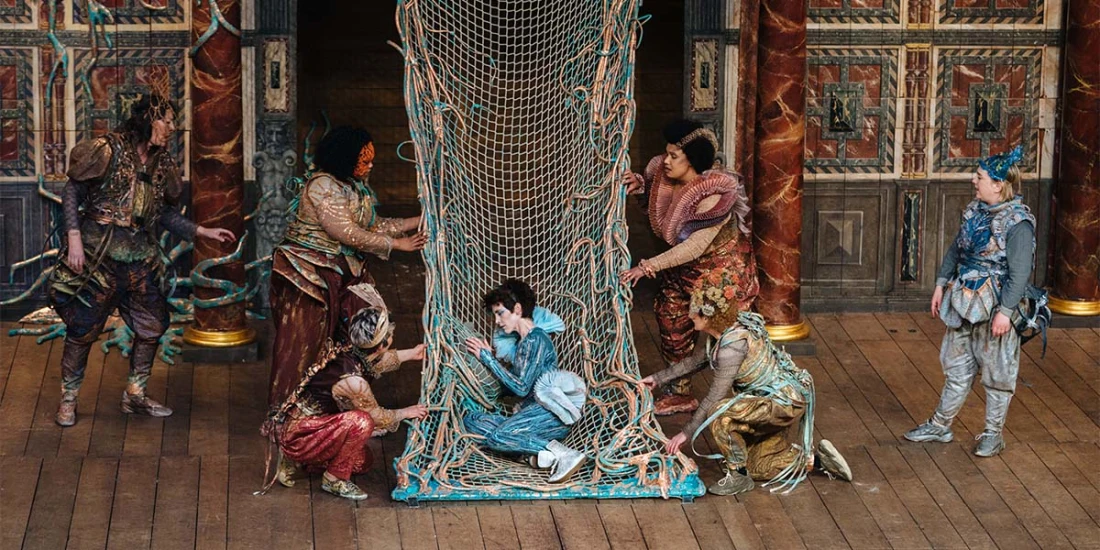'A Midsummer Night's Dream' review — lively production is extravagant but busy
Read our three-star review of A Midsummer Night's Dream, directed by Elle While, now in performances at Shakespeare's Globe Theatre through 12 August.
“Reason and love keep little company,” we’re reliably informed some way into A Midsummer Night’s Dream, the Shakespeare play that perhaps more than any other invites reinvention.
And why not, given the degree to which the irrational is embedded in this title’s very fabric. This, after all, is a play in which Puck claims to be able to put “a girdle around the earth in 40 minutes” and where the fairy queen, Titania, can fall for the donkey she assumes the weaver, Nick Bottom, to be.
So it’s no surprise that Elle While’s busy, bustling production – its opening delayed by illness – finds its own way into Shakespeare’s most otherworldly comedy, complete with the most extravagant costuming, courtesy the international designer takis, who is working at full tilt here. (Theseus’s splendiferous raiments are themselves worthy of permanent display.)
You quickly come to expect the unexpected, from a prologue that takes revelry to newly enthusiastic heights and on to our first glimpse of Michelle Terry’s extraordinary-looking Puck, who could well have stepped out of the visual world of Arthur Rackham or the Jim Henson Creature Shop.
Only at the very end does this performer, herself the Globe’s artistic director, remove the enveloping headgear that allows us to see her actual face. Advancing towards the audience, hands in her pockets, she’s a disarmingly casual presence. Can this be the same figure who, not much earlier, was seen silencing the musicians visible above the action or inducing shrieks at the breadth of her cunning.
Terry is always a pleasure to encounter at this, or any, address, her command of the language so complete that she finds a playfulness where others might not. “I go, I go, look how I go,” she says, vampily drawing a laugh on this simplest-seeming of lines. Elsewhere, her Puck is a strange, supernatural creature who looks of a piece with the tendrils that seem visibly to be crawling up the side of the Globe’s sturdy oak pillars. (The design is by Paul Williams, who goes by the solo moniker Wills.)
The show has been cast as inclusively as I’ve yet come across at a theatre boldly at the forefront on such matters. Nick Bottom is here Nicola Bottome (accent very much on the second syllable), a gender flip allowing the lovely Mariah Gale to relish the pronunciation of her own name in a linguistic climate in which words like “prologue” and “epilogue” get a ludicrous comic spin. (Gale deliberately hiccups her way through much of the part, aptly enough when you’re wanting to convey a donkey.)
Hermia, in turn, is that perpetual live wire Francesca Mills, whose achondroplasia, or short-limbed dwarfism, lends a real sting to the character’s self-questioning amidst the gathering mania of the lovers that she is “so dwarfish and so low.” (The same performer was crucially invigorating in the Francesca Martinez play All of Us last year at the National.)
At times, you wish the production’s component parts cohered rather more fully: Missing is the unifying point of view that made something both dark and dazzling of Nicholas Hytner’s pre-pandemic Midsummer Night’s Dream for the Bridge Theatre, still the defining version of this play in recent years.
Mills’s energy notwithstanding, the lovers don’t really land; the stakes between them feel notably low even with the Helena of Isobel Thom, the nonbinary performer who led last season’s Globe company of the new play I, Joan. (Lysander and Demetrius are correspondingly pallid.) And though the Mechanicals’ play within-a-play is endearingly stage managed by Rebecca Root’s Peter Quince, that scene devolves into a competitive mugging that a tighter handle on the whole might put right.
Unusually, the characteristic doubling of Oberon and Theseus – adroitly managed by the ever-charismatic Jack Laskey, a Globe mainstay – isn’t given in this instance to Titania and Hippolyta, as well. That latter role is played by Anne Odeke without the suggestion of feminine subjugation that has attended views on this warrior-queen of late (and was very evident in the Hytner version). Titania, meanwhile, is in the radiant hands of Marianne Oldham, whose immediate stage authority brings to mind a younger Harriet Walter, which is no bad thing.
The vibe suggests a rave that could perhaps turn at any minute and that gives particular pride of place to the brass-intensive band who knock James Maloney’s score out of the park – or, in this case, yard. Actual engagement with the yard is here less than is the norm, though Theseus does recline toward the lip of the stage to deliver his “airy nothing” remarks around the same time that Hippolyta attempts a backward roll with which those standing near the front could perhaps assist.
And the climactic dance – another Globe mainstay – carries a particular frenzy. Make merry, it seems to be suggesting, and feast on what mirth you can before the madness of the world, like the broom-wielding Puck, sweeps it all away.
Photo credit: The company of A Midsummer Night's Dream at Shakespeare's Globe. (Photo by Helen Murray)
Originally published on
